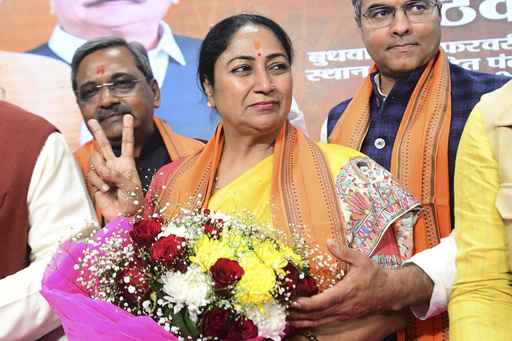
NEW DELHI — On Wednesday, India’s dominant Hindu nationalist party appointed a woman as the leading government official for the state of New Delhi, which encompasses the nation’s capital. This move comes as Prime Minister Narendra Modi aims to strengthen his party’s influence following their victory in the recent local elections.
Rekha Gupta, a 50-year-old former student leader of the party, has been designated as the chief minister of New Delhi, according to Bharatiya Janata Party (BJP) official Ravi Shankar Prasad. The BJP achieved a significant milestone by winning the majority of seats in the New Delhi elections, marking their first victory in this region after a 27-year gap. They secured 48 out of 70 seats, thereby unseating the Aam Aadmi Party (AAP), which managed to capture 22 seats.
Upon her appointment, Gupta expressed gratitude towards her party and committed to addressing the pressing challenges that lie ahead. She will be tasked with tackling critical issues such as air and river pollution, along with the infrastructural deficiencies plaguing the Indian capital. During the campaign, Gupta’s party proposed initiatives aimed at reforming government schools, providing free healthcare services, offering free electricity, and instituting a monthly stipend exceeding 2,500 rupees (approximately $29) for underprivileged women residing in Delhi.
Although Gupta is now the fourth female chief minister in Delhi, the appointment of women to prominent political roles remains relatively uncommon in India. Mamata Banerjee, the leader of the All India Trinamool Congress party, is currently the only other woman serving as a chief minister in the country. Additionally, a proposed law aimed at ensuring that 33% of legislative seats are occupied by women is set to be enforced by 2029. At present, women account for about 14% of parliamentary positions, which is the highest representation since India gained independence, but still trails behind the global average of 26.5%.
Gupta has a substantial political background, having previously acted as a BJP general secretary. Her political career began in 1992 when she served as a student leader at Delhi University. She has garnered a reputation for advocating for women and children’s welfare, alongside her support for economically disadvantaged female students.
The BJP’s dominance in Delhi represents a notable revival after being out of power for over 25 years. The party had previously relinquished control to the Congress party, which governed from 1998 to 2013, before the emergence of the AAP, which gained popularity by campaigning on an anti-corruption platform.
This latest victory serves as a morale booster for the BJP, particularly following their inability to secure a majority in the previous year’s national elections, which compelled them to form a government with coalition partners. Recent victories in three state elections across northern Haryana and Delhi, as well as western Maharashtra, have allowed the party to regain some of its lost standing.
In preparation for the recent elections, the BJP enacted a reduction in income taxes for the salaried middle class, one of their core voter demographics, within the federal budget.
The AAP faced considerable challenges, notably following the arrest of its founder and leader Arvind Kejriwal last year along with two other officials, on allegations of accepting bribes from a liquor distributor. They have refuted these claims, asserting they are part of a larger political scheme. Kejriwal, along with the others, was later granted bail by the Supreme Court, after which he resigned from his position as chief minister of Delhi.

